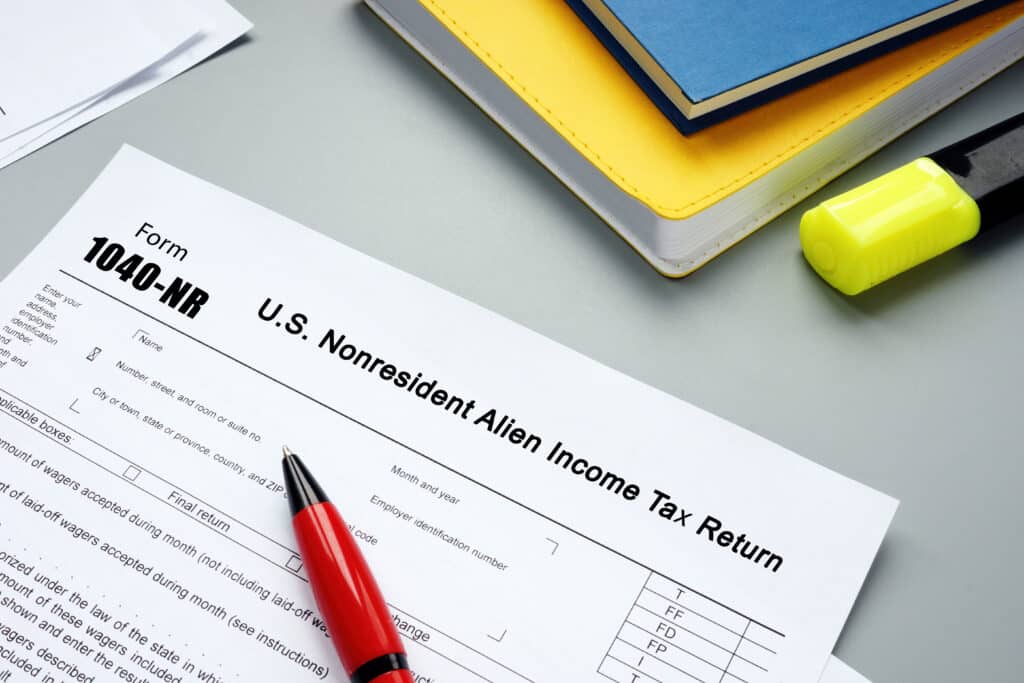The Ultimate Guide to Filing Your Non-Resident Tax Return

The American tax code is one of the most complex systems in the world. Each year, anyone who has earned income in the U.S. must determine their tax liability. This obligation extends to non-U.S. citizens as well. For non-residents, this means filing a non-resident tax return to ensure compliance with U.S. tax laws.
If you have investments or earned income in the U.S., you might need to pay income tax, even if you aren’t a U.S. citizen. Nonresident aliens, or individuals legally present in the United States but not permanent residents, face unique tax rules. Understanding these rules is crucial, as determining the U.S. tax burden for nonresident aliens can be particularly challenging. The process begins with filling out Form 1040-NR, but it can quickly grow into a tax return spanning dozens of pages.
If you are a nonresident alien, you must understand how taxation works in the United States. This ensures that you properly file and pay your United States income tax on Form 1040-NR.
Who are Non-residents for Tax Purposes?
The IRS considers individuals who do not meet specific residency criteria as nonresidents for tax purposes. The IRS uses two main tests to determine an individual’s tax residency status if they are not a U.S. citizen. These are the green card test and the substantial presence test.
- Green Card Test
If the U.S. Citizenship and Immigration Services (USCIS) issues you an alien registration card (green card), you are a lawful permanent resident of the United States at any time during the year. If you hold a green card, the IRS considers you a resident alien for tax purposes, regardless of your actual physical presence in the U.S. during the year.
- Substantial Presence Test
You meet the substantial presence test if you are physically present in the U.S. for at least 31 days during the current year and 183 days during the three-year period, including the current year and the two preceding years. The calculation includes:
- All the days you were present in the current year.
- 1/3 of the days you were present in the first year before the current year.
- 1/6 of the days you were present in the second year before the current year.
If you do not meet either of these tests, the IRS considers you a non-resident alien for tax purposes. Non-resident aliens are typically taxed only on their U.S.-source income and must file Form 1040-NR.
TIP: If you spend less than 183 days in the U.S. and maintain a closer connection to a foreign country, you might qualify for the closer connection exception to the substantial presence test. File Form 8840 to claim this exception.
What is Form 1040-NR?

Form 1040-NR, the U.S. Nonresident Alien Income Tax Return, is the tax form non-resident aliens must use to report their U.S. source income. Non-resident aliens are individuals who are not U.S. citizens and do not pass the green card test or the substantial presence test. This form is for those who engage in business or trade in the U.S. or earn income from U.S. sources. This includes wages, scholarships, dividends, and capital gains.ources, including wages, scholarships, dividends, and capital gains.
Two Types of Non-Resident Tax Returns
Filing a non-resident tax return generally means one of two things: filing a non-resident federal tax return and/or filing a non-resident state tax return. Each type addresses different circumstances and involves specific requirements.
Non-Resident State Tax Returns
The definition of residency differs from state to state and adds an additional layer of complexity as not all states are the same. A nonresident state tax return is a return to a state you are not a resident of. If you’ve generated income in another state during the year, you may have to file a nonresident state tax return in addition to the tax return to your home state.
Generally, you’ll need to file a nonresident state return if you have income from sources in a state where you’re not a resident. Some examples include:
- Wages or income you earned while working in that state but not residing/living in the state,
- Out-of-state rental income or capital gains from property sales
- Gambling winnings
- S Corporation or partnership income
Every state has its own rules regarding nonresident returns. For example, nonresidents with more than $33 in Pennsylvania-sourced income must file a return, while nonresidents with less than $600 in Missouri income don’t have to file. If unsure, your best bet is to contact the taxing authority in that state or visit their website. Most state websites have a section devoted to nonresidents and part-year residents.
Federal Non-Resident Alien Tax Returns
Federal non-resident alien tax returns can be more complex than resident tax returns filed with the IRS as there are unique rules for claiming deductions, credits, dependents and tax treaty benefits that may apply that are not generally considered for a US resident tax return. Non-resident alien tax returns are required for non-resident aliens with US source income and meet the minimum filing requirements to file a non-resident tax return.
TIP: If you switch between resident and nonresident status during the year, you might have a dual-status tax year. This requires you to file forms 1040 and 1040-NR, which can sometimes result in tax advantages.
Who Must File A Non-Resident Tax Return?

Non-resident aliens in the United States may be required to file a tax return under several circumstances. Here are the primary conditions under which you must or should file Form 1040-NR, the U.S. Nonresident Alien Income Tax Return:
- Engaged in a Trade or Business in the U.S.
If you are a nonresident alien engaging or considered engaging in a trade or business in the United States during the year, you must file a return. This includes any income effectively connected with a U.S. trade or business. However, if your only U.S. source income is wages less than the personal exemption amount, you do not need to file.
- U.S. Source Income with Unmet Tax Liability
Nonresident aliens who are not engaged in a trade or business but have U.S. income on which the tax liability was not fully satisfied through withholding must file a return. This often applies to passive income such as dividends, interest, or rental income.
- Nonresident Alien Students, Teachers, or Trainees
The IRS considers nonresident aliens temporarily present in the United States on an “F,” “J,” “M,” or “Q” visa as engaging in a trade or business in the U.S. You must file Form 1040-NR if you have income that is subject to tax, such as wages, tips, scholarships, fellowship grants, and dividends.
- Mandatory Withholdings Exceeding Tax Due
If there were mandatory withholdings that exceed the amount of U.S. tax due, filing a non-resident alien tax return allows you to claim a refund. Non-resident aliens can also claim certain deductions, credits, and tax treaty benefits, potentially making filing beneficial.
- Representatives and Fiduciaries
If you are a representative or agent responsible for filing the return of a nonresident alien individual or a fiduciary for a nonresident alien estate or trust, you may need to file a return on behalf of the individual or entity.
Nonresident Tax Filing Requirements
Non-resident aliens are generally subject to U.S. income tax only on their U.S. source income. The IRS taxes this income under two systems: effectively connected income (ECI) and fixed or determinable, annual, or periodic (FDAP) income.
- Effectively Connected Income (ECI)
ECI refers to income earned from the active conduct of a trade or business within the United States. This includes wages, salaries, and self-employment income. The IRS taxes ECI for non-resident aliens at the same graduated rates as U.S. citizens, allowing for similar deductions and credits that residents can claim.This means that if you earn money through work or business activities in the U.S., you will report and pay taxes on that income using Form 1040-NR.
- Fixed or Determinable, Annual, or Periodic (FDAP) Income
FDAP income includes passive income such as interest, dividends, rents, and royalties. Unlike ECI, the IRS typically taxes FDAP income at a flat 30% rate unless a tax treaty specifies a lower rate. This type of income does not allow the same deductions as ECI and you must report it separately on Form 1040-NR.
Nonresident Tax Treaties
The United States has income tax treaties with a number of foreign countries. For non-resident alien tax, these treaties can often reduce or eliminate U.S. tax on various types of personal services and other income, such as pensions, interest, dividends, royalties, and capital gains. Each treaty must be reviewed to determine whether specific types of income are exempt from U.S. tax or taxed at a reduced rate.
Need US expat tax advice? Book a consultation now!
Taxation Between Resident Aliens vs. Non-Resident Aliens

The taxation rules for nonresident aliens in the U.S. differ significantly from those for U.S. citizens and resident aliens.
U.S. citizens and resident aliens must report and pay taxes on their global income. This means that all income, whether earned domestically or internationally, is subject to U.S. taxation. They can also claim various tax benefits such as the standard deduction, child tax credit, and foreign tax credits, which help prevent double taxation. Resident aliens typically file their taxes using Form 1040.
In contrast, nonresident aliens are only taxed on their U.S.-sourced income. They do not have to report income earned outside the United States. This means a nonresident alien only needs to pay U.S. taxes on income that is directly connected to U.S. sources, such as wages earned from U.S. employment or income from U.S. investments.
Additionally, nonresident aliens typically cannot claim the same tax deductions and credits that are available to U.S. citizens and resident aliens. There are exceptions, such as specific tax treaty benefits, but generally, nonresident aliens have more limited options for reducing their taxable income.
Available Deductions for Nonresident Aliens
Nonresident aliens have fewer deductions and credits than U.S. citizens and resident aliens. Generally, nonresident aliens can only deduct specific expenses directly related to their U.S. income. Here are some of the key deductions available:
- State and local income taxes,
- Charitable contributions to U.S. non-profit organizations,
- Casualty and theft losses from a federally declared disaster,
- Ordinary and necessary expenses incurred in the conduct of a U.S. trade or business and,
- Other itemized deductions.
How To Complete Form 1040-NR

Like other US tax forms, Form 1040-NR is designed to capture all aspects of a filer’s financial life related to reporting income subject to US taxation. Just like the more widely known Form 1040 filled out by citizens and green card holders, there are several versions of the tax form used by a non-resident alien, including a 1040-NR-EZ form designed to simplify the process of determining how much is owed.
To fill out any of these forms, you must have detailed records of the amount and sources of income, as well as supporting documentation for any deductions and exemptions you are eligible to claim. You’ll need to provide detailed figures for your US income, including all capital gains from the sale of stock and income earned as an independent contractor or business owner. You may also need to file additional forms detailing your financial information for a business, rental income, scholarship or grant money, and many other types of income.
When to File the Form
The deadline for filing Form 1040-NR, U.S. Nonresident Alien Income Tax Return, is generally April 15th following the tax year. However, if you did not earn wages subject to U.S. income tax withholding, the deadline is extended to June 15th. If you cannot file by the due date, you may request an extension by filing Form 4868, which grants an automatic extension until October 15th.
Where to File the Form
Form 1040-NR can be filed electronically or by mail. E-filing is recommended as it speeds up the processing of your return and potential refund. If you choose to mail your return, the address depends on whether you are including a payment with your return.
- Without Payment:
Department of the Treasury
Internal Revenue Service
Austin, TX 73301-0215
USA
- With Payment:
Internal Revenue Service
P. O. Box 1303
Charlotte, NC 28201-1303
USA
TIP: Whenever possible, choose to e-file your Form 1040-NR. This option speeds up processing times and reduces the risk of errors compared to mailing a paper return.
Frequently Asked Questions About Form 1040-NR

- Does a nonresident have to file a tax return?
Nonresident aliens are generally subject to U.S. income tax only on their U.S. source income. They are subject to two different tax rates. One applies to effectively connected income, and the other to fixed or determinable, annual, or periodic (FDAP) income. Effectively connected income (ECI) refers to income earned in the U.S. from operating a business in the U.S. or from personal services performed in the U.S.(such as wages or self-employment income). It is taxed for a nonresident at the same graduated rates as for a U.S. person. FDAP income is passive income, such as interest, dividends, rents or royalties. This income is taxed at a flat 30% rate unless a tax treaty specifies a lower rate.
Nonresident aliens must file and pay any tax due using Form 1040NR, U.S. Non-Resident Tax Return.
- Is a temporary resident a resident for tax purposes?
If you are a nonresident alien (not a U.S. citizen), you are considered a resident taxpayer if you meet one of two tests: the green card test or the substantial presence test for the calendar year (January 1 – December 31). If you do not meet either the Green Card Test or the Substantial Presence Test, you are a nonresident alien and considered a nonresident for tax purposes.
- What taxes are non-resident aliens exempt from?
The United States has income tax treaties with a number of foreign countries. For nonresident alien tax, these treaties can often reduce or eliminate U.S. tax on various types of personal services and other income, such as pensions, interest, dividends, royalties, and capital gains. Each treaty must be reviewed to determine whether specific types of income are exempt from U.S. tax or taxed at a reduced rate.
Get Help Completing a Nonresident Tax Return
Filing Form 1040-NR is complex and often more challenging than filing standard returns for residents. Due to the intricate rules and unique requirements for nonresident aliens, seeking help from a professional tax preparation service is advisable.
At Tax Samaritan, we offer convenient and affordable professional tax preparation services specifically for nonresident aliens. Our knowledgeable tax professionals handle all aspects of preparing your return and performing necessary calculations. You only need to answer a few simple questions. We prepare the 1040-NR and any required state returns, ensuring you benefit from all applicable tax treaty advantages and deductions. Our goal is to minimize your tax liability and maximize your refund.

All About Randall Brody
Randall is the Founder of Tax Samaritan, a boutique firm specializing in the preparation of taxes and the resolution of tax problems for Americans living abroad, as well as the other unique tax issues that apply to taxpayers. Here, they help taxpayers save money on their tax returns.